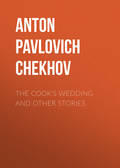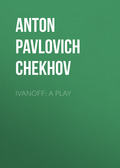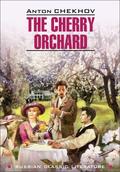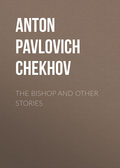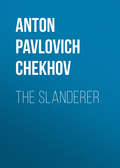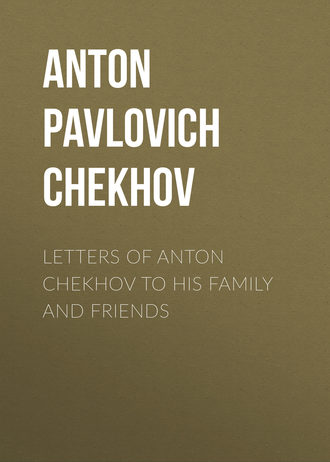
Антон Чехов
Letters of Anton Chekhov to His Family and Friends
TAGANROG,
May 11.
… From K.‘s I went to the Holy Mountains… I came to Slavyansk on a dark evening. The cabmen refuse to take me to the Holy Mountains at night, and advise me to spend the night at Slavyansk, which I did very willingly, for I felt broken and lame with pain… The town is something like Gogol’s Mirgorod; there is a hairdresser and a watchmaker, so that one may hope that in another thousand years there will be a telephone. The walls and fences are pasted with the advertisements of a menagerie… On green and dusty streets walk pigs, cows, and other domestic creatures. The houses look cordial and friendly, rather like kindly grandmothers; the pavements are soft, the streets are wide, there is a smell of lilac and acacia in the air; from the distance come the singing of a nightingale, the croaking of frogs, barking, and sounds of a harmonium, of a woman screeching… I stopped in Kulikov’s hotel, where I took a room for seventy-five kopecks. After sleeping on wooden sofas and washtubs it was a voluptuous sight to see a bed with a mattress, a washstand… Fragrant breezes came in at the wide-open window and green branches thrust themselves in. It was a glorious morning. It was a holiday (May 6th) and the bells were ringing in the cathedral. People were coming out from mass. I saw police officers, justices of the peace, military superintendents, and other principalities and powers come out of the church. I bought two kopecks’ worth of sunflower seeds, and hired for six roubles a carriage on springs to take me to the Holy Mountains and back (in two days’ time). I drove out of the town through little streets literally drowned in the green of cherry, apricot, and apple trees. The birds sang unceasingly. Little Russians whom I met took off their caps, taking me probably for Turgenev; my driver jumped every minute off the box to put the harness to rights, or to crack his whip at the boys who ran after the carriage… There were strings of pilgrims along the road. On all sides there were white hills, big and small. The horizon was bluish-white, the rye was tall, oak copses were met with here and there – the only things lacking were crocodiles and rattlesnakes.
I came to the Holy Mountains at twelve o’clock. It is a remarkably beautiful and unique place. The monastery stands on the bank of the river Donets at the foot of a huge white rock covered with gardens, oaks, and ancient pines crowded together and over-hanging, one above another. It seems as if the trees had not enough room on the rock, and as if some force were driving them upwards… The pines literally hang in the air and look as though they might fall any minute. Cuckoos and nightingales sing night and day.
The monks, very pleasant people, gave me a very unpleasant room with a pancake-like mattress. I spent two nights at the monastery and gathered a mass of impressions. While I was there some fifteen thousand pilgrims assembled because of St. Nicolas’ Day; eight-ninths of them were old women. I did not know before that there were so many old women in the world; had I known, I would have shot myself long ago. About the monks, my acquaintance with them and how I gave medical advice to the monks and the old women, I will write to the Novoye Vremya and tell you when we meet. The services are endless: at midnight they ring for matins, at five for early mass, at nine for late mass, at three for the song of praise, at five for vespers, at six for the special prayers. Before every service one hears in the corridors the weeping sound of a bell, and a monk runs along crying in the voice of a creditor who implores his debtor to pay him at least five kopecks for a rouble:
“Lord Jesus Christ, have mercy upon us! Please come to matins!”
It is awkward to stay in one’s room, and so one gets up and goes out. I have chosen a spot on the bank of the Donets, where I sit during all the services.
I have bought an ikon for Auntie. [Translator’s Note: His mother’s sister.] The food is provided gratis by the monastery for all the fifteen thousand: cabbage soup with dried fresh-water fish and porridge. Both are good, and so is the rye bread.
The church bells are wonderful. The choir is not up to much. I took part in a religious procession on boats.
TO V. G. KOROLENKO
MOSCOW, October 17, 1887.
… I am extremely glad to have met you. I say it sincerely and with all my heart. In the first place, I deeply value and love your talent; it is dear to me for many reasons. In the second, it seems to me that if you and I live in this world another ten or twenty years we shall be bound to find points of contact. Of all the Russians now successfully writing I am the lightest and most frivolous; I am looked upon doubtfully; to speak the language of the poets, I have loved my pure Muse but I have not respected her; I have been unfaithful to her and often took her to places that were not fit for her to go to. But you are serious, strong, and faithful. The difference between us is great, as you see, but nevertheless when I read you, and now when I have met you, I think that we have something in common. I don’t know if I am right, but I like to think it.
TO HIS BROTHER ALEXANDR
MOSCOW, November 20, 1887.
Well, the first performance [Translator’s Note: “Ivanov.”] is over. I will tell you all about it in detail. To begin with, Korsh promised me ten rehearsals, but gave me only four, of which only two could be called rehearsals, for the other two were tournaments in which messieurs les artistes exercised themselves in altercation and abuse. Davydov and Glama were the only two who knew their parts; the others trusted to the prompter and their own inner conviction.
Act One. – I am behind the stage in a small box that looks like a prison cell. My family is in a box of the benoire and is trembling. Contrary to my expectations, I am cool and am conscious of no agitation. The actors are nervous and excited, and cross themselves. The curtain goes up … the actor whose benefit night it is comes on. His uncertainty, the way that he forgets his part, and the wreath that is presented to him make the play unrecognizable to me from the first sentences. Kiselevsky, of whom I had great hopes, did not deliver a single phrase correctly – literally not a single one. He said things of his own composition. In spite of this and of the stage manager’s blunders, the first act was a great success. There were many calls.
Act Two. – A lot of people on the stage. Visitors. They don’t know their parts, make mistakes, talk nonsense. Every word cuts me like a knife in my back. But – o Muse! – this act, too, was a success. There were calls for all the actors, and I was called before the curtain twice. Congratulations and success.
Act Three. – The acting is not bad. Enormous success. I had to come before the curtain three times, and as I did so Davydov was shaking my hand, and Glama, like Manilov, was pressing my other hand to her heart. The triumph of talent and virtue.
Act Four, Scene One. – It does not go badly. Calls before the curtain again. Then a long, wearisome interval. The audience, not used to leaving their seats and going to the refreshment bar between two scenes, murmur. The curtain goes up. Fine: through the arch one can see the supper table (the wedding). The band plays flourishes. The groomsmen come out: they are drunk, and so you see they think they must behave like clowns and cut capers. The horseplay and pot-house atmosphere reduce me to despair. Then Kiselevsky comes out: it is a poetical, moving passage, but my Kiselevsky does not know his part, is drunk as a cobbler, and a short poetical dialogue is transformed into something tedious and disgusting: the public is perplexed. At the end of the play the hero dies because he cannot get over the insult he has received. The audience, grown cold and tired, does not understand this death (the actors insisted on it; I have another version). There are calls for the actors and for me. During one of the calls I hear sounds of open hissing, drowned by the clapping and stamping.
On the whole I feel tired and annoyed. It was sickening though the play had considerable success…
Theatre-goers say that they had never seen such a ferment in a theatre, such universal clapping and hissing, nor heard such discussions among the audience as they saw and heard at my play. And it has never happened before at Korsh’s that the author has been called after the second act.
November 24
… It has all subsided at last, and I sit as before at my writing-table and compose stories with untroubled spirit. You can’t think what it was like! … I have already told you that at the first performance there was such excitement in the audience and on the stage as the prompter, who has served at the theatre for thirty-two years, had never seen. They made an uproar, shouted, clapped and hissed; at the refreshment bar it almost came to fighting, and in the gallery the students wanted to throw someone out and two persons were removed by the police. The excitement was general…
… The actors were in a state of nervous tension. All that I wrote to you and Maslov about their acting and attitude to their work must not, of course, go any further. There is much one has to excuse and understand… It turned out that the actress who was doing the chief part in my play had a daughter lying dangerously ill – how could she feel like acting? Kurepin did well to praise the actors.
The next day after the performance there was a review by Pyotr Kitcheyev in the Moskovsky Listok. He calls my play impudently cynical and immoral rubbish. The Moskovskiya Vyedomosti praised it.
… If you read the play you will not understand the excitement I have described to you; you will find nothing special in it. Nikolay, Shehtel, and Levitan – all of them painters – assure me that on the stage it is so original that it is quite strange to look at. In reading one does not notice it.
TO D. V. GRIGOROVITCH
MOSCOW, 1887.
I have just read “Karelin’s Dream,” and I am very much interested to know how far the dream you describe really is a dream. I think your description of the workings of the brain and of the general feeling of a person who is asleep is physiologically correct and remarkably artistic. I remember I read two or three years ago a French story, in which the author described the daughter of a minister., and probably without himself suspecting it, gave a correct medical description of hysteria. I thought at the time that an artist’s instinct may sometimes be worth the brains of a scientist, that both have the same purpose, the same nature, and that perhaps in time, as their methods become perfect, they are destined to become one vast prodigious force which now it is difficult even to imagine… “Karelin’s Dream” has suggested to me similar thoughts, and to-day I willingly believe Buckle, who saw in Hamlet’s musings on the dust of Alexander the Great, Shakespeare’s knowledge of the law of the transmutation of substance – i.e., the power of the artist to run ahead of the men of science… Sleep is a subjective phenomenon, and the inner aspect of it one can only observe in oneself. But since the process of dreaming is the same in all men, every reader can, I think, judge Karelin by his own standards, and every critic is bound to be subjective. From my own personal experience this is how I can formulate my impression.
In the first place the sensation of cold is given by you with remarkable subtlety. When at night the quilt falls off I begin to dream of huge slippery stones, of cold autumnal water, naked banks – and all this dim, misty, without a patch of blue sky; sad and dejected like one who has lost his way, I look at the stones and feel that for some reason I cannot avoid crossing a deep river; I see then small tugs that drag huge barges, floating beams… All this is infinitely grey, damp, and dismal. When I run from the river I come across the fallen cemetery gates, funerals, my school-teachers… And all the time I am cold through and through with that oppressive nightmare-like cold which is impossible in waking life, and which is only felt by those who are asleep. The first pages of “Karelin’s Dream” vividly brought it to my memory – especially the first half of page five, where you speak of the cold and loneliness of the grave.
I think that had I been born in Petersburg and constantly lived there, I should always dream of the banks of the Neva, the Senate Square, the massive monuments.
When I feel cold in my sleep I dream of people… I happened to have read a criticism in which the reviewer blames you for introducing a man who is “almost a minister,” and thus spoiling the generally dignified tone of the story. I don’t agree with him. What spoils the tone is not the people but your characterization of them, which in some places interrupts the picture of the dream. One does dream of people, and always of unpleasant ones… I, for instance, when I feel cold, always dream of my teacher of scripture, a learned priest of imposing appearance, who insulted my mother when I was a little boy; I dream of vindictive, implacable, intriguing people, smiling with spiteful glee – such as one can never see in waking life. The laughter at the carriage window is a characteristic symptom of Karelin’s nightmare. When in dreams one feels the presence of some evil will, the inevitable ruin brought about by some outside force, one always hears something like such laughter… One dreams of people one loves, too, but they generally appear to suffer together with the dreamer.
But when my body gets accustomed to the cold, or one of my family covers me up, the sensation of cold, of loneliness, and of an oppressive evil will, gradually disappears… With the returning warmth I begin to feel that I walk on soft carpets or on grass, I see sunshine, women, children… The pictures change gradually, but more rapidly than they do in waking life, so that on awaking it is difficult to remember the transitions from one scene to another… This abruptness is well brought out in your story, and increases the impression of the dream.
Another natural fact you have noticed is also extremely striking: dreamers express their moods in outbursts of an acute kind, with childish genuineness, like Karelin. Everyone knows that people weep and cry out in their sleep much more often than they do in waking life. This is probably due to the lack of inhibition in sleep and of the impulses which make us conceal things.
Forgive me, I so like your story that I am ready to write you a dozen sheets, though I know I can tell you nothing new or good… I restrain myself and am silent, fearing to bore you and to say something silly.
I will say once more that your story is magnificent. The public finds it “vague,” but to a writer who gloats over every line such vagueness is more transparent than holy water… Hard as I tried I could detect only two small blots, even those are rather farfetched!
(1) I think that at the beginning of the story the feeling of cold is soon blunted in the reader and becomes habitual, owing to the frequent repetition of the word “cold,” and (2), the word “glossy” is repeated too often.
There is nothing else I could find, and I feel that as one is always feeling the need of refreshing models, “Karelin’s Dream” is a splendid event in my existence as an author. This is why I could not contain myself and ventured to put before you some of my thoughts and impressions.
There is little good I can say about myself. I write not what I want to be writing, and I have not enough energy or solitude to write as you advised me… There are many good subjects jostling in my head – and that is all. I am sustained by hopes of the future, and watch the present slip fruitlessly away.
Forgive this long letter, and accept the sincere good wishes of your devoted
A. CHEKHOV.
TO V. G. KOROLENKO
MOSCOW, January 9, 1888.
Following your friendly advice I began writing a story [Footnote: “The Steppe”] for the Syeverny Vyestnik. To begin with I have attempted to describe the steppe, the people who live there, and what I have experienced in the steppe. It is a good subject, and I enjoy writing about it, but unfortunately from lack of practice in writing long things, and from fear of making it too rambling, I fall into the opposite extreme: each page turns out a compact whole like a short story, the pictures accumulate, are crowded, and, getting in each other’s way, spoil the impression as a whole. As a result one gets, not a picture in which all the details are merged into one whole like stars in the heavens, but a mere diagram, a dry record of impressions. A writer – you, for instance – will understand me, but the reader will be bored and curse.
… Your “Sokolinets” is, I think, the most remarkable novel that has appeared of late. It is written like a good musical composition, in accordance with all the rules which an artist instinctively divines. Altogether in the whole of your book you are such a great artist, such a force, that even your worst failings, which would have been the ruin of any other writer, pass unnoticed. For instance, in the whole of your book there is an obstinate exclusion of women, and I have only just noticed it.
TO A. N. PLESHTCHEYEV
MOSCOW, February 5, 1888.
… I am longing to read Korolenko’s story. He is my favourite of contemporary writers. His colours are rich and vivid, his style is irreproachable, though in places rather elaborate, his images are noble. Leontyev [Footnote: I. L. Shtcheglov.] is good too. He is not so mature and picturesque, but he is warmer than Korolenko, more peaceful and feminine… But, Allah kerim, why do they both specialize? The first will not part with his convicts, and the second feeds his readers with nothing but officers… I understand specialization in art such as genre, landscape, history, but I cannot admit of such specialties as convicts, officers, priests… This is not specialization but partiality. In Petersburg you do not care for Korolenko, and here in Moscow we do not read Shtcheglov, but I fully believe in the future of both of them. Ah, if only we had decent critics!
February 9
… You say you liked Dymov [Translator’s Note: One of the characters in “The Steppe.”] as a subject. Life creates such characters as the dare-devil Dymov not to be dissenters nor tramps, but downright revolutionaries… There never will be a revolution in Russia, and Dymov will end by taking to drink or getting into prison. He is a superfluous man.
March 6
It is devilishly cold, but the poor birds are already flying to Russia! They are driven by homesickness and love for their native land. If poets knew how many millions of birds fall victims to their longing and love for their homes, how many of them freeze on the way, what agonies they endure on getting home in March and at the beginning of April, they would have sung their praises long ago! … Put yourself in the place of a corncrake who does not fly but walks all the way, or of a wild goose who gives himself up to man to escape being frozen… Life is hard in this world!
TO I. L. SHTCHEGLOV
MOSCOW, April 18, 1888.
… In any case I am more often merry than sad, though if one comes to think of it I am bound hand and foot… You, my dear man, have a flat, but I have a whole house which, though a poor specimen, is still a house, and one of two storeys, too! You have a wife who will forgive your having no money, and I have a whole organization which will collapse if I don’t earn a sufficient number of roubles a month – collapse and fall on my shoulders like a heavy stone.
May 3
… I have just sent a story [Footnote: “The Lights.”] to the Syeverny Vyestnik. I feel a little ashamed of it. It is frightfully dull, and there is so much discussion and preaching in it that it is mawkish. I didn’t like to send it, but had to, for I need money as I do air…
I have had a letter from Leman. He tells me that “we” (that is all of you Petersburg people) “have agreed to print advertisements about each other’s work on our books,” invites me to join, and warns me that among the elect may be included only such persons as have a “certain degree of solidarity with us.” I wrote to say that I agreed, and asked him how does he know with whom I have solidarity and with whom I have not? How fond of stuffiness you are in Petersburg! Don’t you feel stifled with such words as “solidarity,” “unity of young writers,” “common interests,” and so on? Solidarity and all the rest of it I admit on the stock-exchange, in politics, in religious affairs, etc., but solidarity among young writers is impossible and unnecessary… We cannot feel and think in the same way, our aims are different, or we have no aims whatever, we know each other little or not at all, and so there is nothing on to which this solidarity could be securely hooked… And is there any need for it? No, in order to help a colleague, to respect his personality and his work, to refrain from gossiping about him, envying him, telling him lies and being hypocritical, one does not need so much to be a young writer as simply a man… Let us be ordinary people, let us treat everybody alike, and then we shall not need any artificially worked up solidarity. Insistent desire for particular, professional, clique solidarity such as you want, will give rise to unconscious spying on one another, suspiciousness, control, and, without wishing to do so, we shall become something like Jesuits in relation to one another… I, dear Jean, have no solidarity with you, but I promise you as a literary man perfect freedom so long as you live; that is, you may write where and how you wish, you may think like Koreisha [Footnote: A well-known religious fanatic in Moscow.] if you like, betray your convictions and tendencies a thousand times, etc., etc., and my human relations with you will not alter one jot, and I will always publish advertisements of your books on the wrappers of mine.



